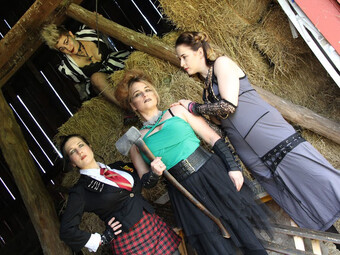Getting to the 'What' of it
Last Monday I was fortunate enough to be able to attend TEDxBroadway at New World Stages in New York City. With no direct experience, but a keen interest, in the Broadway scene, I was excited to have the opportunity to spend the day listening to fourteen experts, industry and outsiders, answer the question: “What’s the best that Broadway can be twenty years from now?” Many have done an incredibly thorough job reporting on the event and so I won’t attempt to offer a complete summary. (If you’re interested in such a recap, I recommend Howard Sherman’s live blog of the day’s activities here.)
Much of the conference was spent discussing who Broadway should be attracting (in terms of both audience and industry), how Broadway could be courting said targeted audiences (largely capitalizing on social networking), and why theatre. The why was most succinctly and quotably summed up by Gregory Mosher: “You can't Google a broken heart. That's what we need Shakespeare for.” A conversation about what the theatre in the theatres should look like and what it should address was slightly less fleshed out. I wanted to take a minute to distill the what in hopes of continuing the conversation that was started on Monday.
The why was most succinctly and quotably summed up by Gregory Mosher: “You can't Google a broken heart. That's what we need Shakespeare for.”
The Original
Jujamcyn President Jordan Roth started the morning by challenging Broadway’s strict definition of “Original,” which he defined in terms of a musical as a piece that is “not based on pre-existing source material” (book and score). He argued that holding the “original” over “adaptation” slights the incredible musical theatre on which the form is built (Oklahoma!, The King and I, etc.) and that the focus should not be on the source material but rather how the source material is adapted. What makes the experience original is that it has the unique opportunity to be experienced live (an idea expanded upon by Randy Weiner). This reframing is liberating. It is liberating to de-stigmatize the adaptation; it takes the pressure off of imagining a story. It is also daunting. It calls attention to the artistry necessary to successfully adapt a book, movie, album, etc. for the stage. How can this shift and how should this shift change producers’, librettists’, composers’, and audiences’ understanding of what is on our stages? How can it “normalize,” and even encourage, aesthetic diversity?
Resurrecting Immortality
Economist and academic Juan Enriquez looked back to the Greeks and forward to the future of biotechnology to advocate for the continued necessity of the theatre. In its beginnings, Enriquez noted, theatre grappled with immortality in the guise of the Olympian gods and heroes, a grappling for which the human connection is uniquely suited. Over two thousand years later, man is approaching immortality, although not quite how Euripides and Aeschylus imagined. Skin cells can become stem cells. Brainwaves can be mapped. Facebook pages live beyond corporeal beings. How far are we from instant facial recognition on our smart phones? How long until we try to preserve brains? How can we more deeply incorporate science and technology into 21st century theatre beyond faster lifts and more screens? How can we engage advances in science and technology to tackle our impending immortality?
Writing for Tomorrow
Theatre is often placed at the periphery of the culture. Author and cultural communications guru Patricia Martin looked at the cultural climate and suggested that theatre was poised to be at the forefront of a forthcoming renaissance. Death (well, a cultural death) has occurred and the internet has emerged as a facilitating medium (the two indicators that a renaissance is approaching). Martin noted that what follows could either be another dark age or another renaissance. What makes the difference? To propel ourselves into an age of enlightenment, we need a compelling story of the future - told creatively and appealing to a young audience. Martin quoted Jung, “The creation of something truly new is not accomplished by the intellect, but by the play instinct, acting out of necessity,” making the case that we are in a moment of necessity. How creative can we be? What are these stories? Enriquez suggested looking to technology. Where else can we look? How are these stories told? If we’re adapting source material, to return to Roth’s point, it is the how of the story that must be forward thinking. Writer and performer Matt Sax made a pitch for diversifying the storytelling by presenting his vision for Broadway 2032 in verse. How can we challenge ourselves to write the narrative of the future?
These three thoughts are by no means exhaustive but were what was bouncing around in my head on the long bus ride home to DC, I hope they’ll provide enough of a jumping off point to catalyze a conversation or three conversations or ten conversations about how we can imagine the what of it twenty years down the line.
Aaron Malkin is the senior Allen Lee Hughes literary fellow at Arena Stage. Before arriving at Arena, Aaron graduated from Brown Univ. with an A.B. in history and served as artistic/administrative intern at Signature Theatre in Arlington, Va. He’s a regular contributor to Arena Stage’s blog, Stage Banter, and Sub/Text: Your Virtual Dramaturg.







Comments
The article is just the start of the conversation—we want to know what you think about this subject, too! HowlRound is a space for knowledge-sharing, and we welcome spirited, thoughtful, and on-topic dialogue. Find our full comments policy here